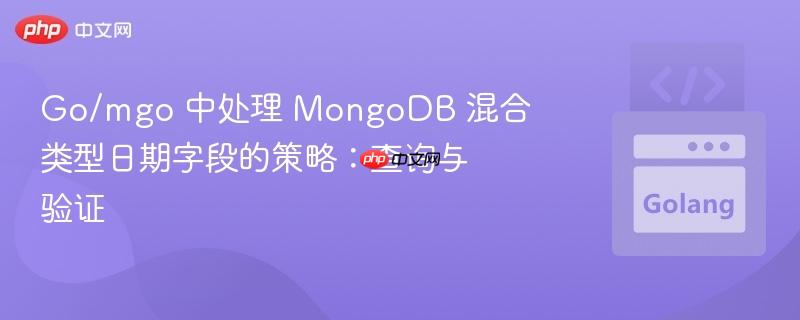
本教程旨在解决 go/mgo 开发中遇到的一个常见问题:如何有效地查询和验证 mongodb 文档中一个可能包含 time.time、布尔值 false 或完全缺失的字段。文章将详细介绍在 go 应用程序内部使用 time.time.iszero() 进行验证,以及利用 mongodb 的 $exists 和 $type 操作符进行数据库层面查询的多种策略,确保开发者能准确识别和处理这些混合数据类型。
当从 MongoDB 中检索到文档并将其映射到 Go 结构体后,如果某个字段被定义为 time.Time 类型,我们可能需要判断其是否被有效设置,而非 Go 语言的 time.Time 零值(即 0001-01-01 00:00:00 +0000 UTC)。time.Time 类型提供了一个 IsZero() 方法来完成此项检查。
package main
import (
"fmt"
"time"
)
// MyDocument 示例结构体,包含一个日期字段
type MyDocument struct {
ID string `bson:"_id"`
EventTime time.Time `bson:"eventTime"` // 假设此字段可能为零值或有效日期
// 其他字段...
}
func main() {
// 示例1:一个包含有效日期时间的文档
doc1 := MyDocument{
ID: "doc1",
EventTime: time.Now(), // 有效日期
}
// 示例2:一个包含零值日期时间的文档
doc2 := MyDocument{
ID: "doc2",
EventTime: time.Time{}, // 零值日期
}
// 检查 doc1 的 EventTime 字段
if doc1.EventTime.IsZero() {
fmt.Printf("文档 %s 的 EventTime 字段是零值。\n", doc1.ID)
} else {
fmt.Printf("文档 %s 的 EventTime 字段是有效日期:%s\n", doc1.ID, doc1.EventTime.Format(time.RFC3339))
}
// 检查 doc2 的 EventTime 字段
if doc2.EventTime.IsZero() {
fmt.Printf("文档 %s 的 EventTime 字段是零值。\n", doc2.ID)
} else {
fmt.Printf("文档 %s 的 EventTime 字段是有效日期:%s\n", doc2.ID, doc2.EventTime.Format(time.RFC3339))
}
}通过 IsZero() 方法,我们可以在 Go 应用程序内部层面轻松判断 time.Time 字段的有效性,从而进行后续的业务逻辑处理。
除了在 Go 应用程序内部进行验证,我们经常需要在数据库层面直接查询满足特定条件的文档。针对一个字段可能为布尔值 false、time.Time 类型或完全缺失的情况,MongoDB 提供了强大的查询操作符。以下是使用 mgo 驱动进行这些查询的方法。
假设我们已建立 mgo 连接并获取了名为 collection 的 mgo.Collection 实例,并且要查询的字段名为 myField。
如果 myField 字段可能存储布尔值,并且我们需要查找所有将其设置为 false 的文档,可以直接在查询条件中指定该布尔值。
package main
import (
"fmt"
"log"
"time"
"gopkg.in/mgo.v2"
"gopkg.in/mgo.v2/bson"
)
// DocumentWithMixedField 示例结构体,用于映射可能包含混合类型字段的文档
type DocumentWithMixedField struct {
ID bson.ObjectId `bson:"_id,omitempty"`
MyField interface{} `bson:"myField"` // 使用 interface{} 来处理混合类型
}
func main() {
// 连接 MongoDB
session, err := mgo.Dial("mongodb://localhost:27017")
if err != nil {
log.Fatalf("Failed to connect to MongoDB: %v", err)
}
defer session.Close()
// 获取数据库和集合
collection := session.DB("testdb").C("mycollection")
// 清空集合并插入一些测试数据(可选,用于演示)
collection.DropCollection()
collection.Insert(DocumentWithMixedField{MyField: false}) // 字段为 false
collection.Insert(DocumentWithMixedField{MyField: true}) // 字段为 true
collection.Insert(DocumentWithMixedField{MyField: time.Now()}) // 字段为日期
collection.Insert(DocumentWithMixedField{MyField: "some string"}) // 字段为字符串
collection.Insert(DocumentWithMixedField{}) // 没有 myField 字段
collection.Insert(DocumentWithMixedField{MyField: false, ID: bson.NewObjectId()}) // 另一个 false
// 查询 myField 字段值为 false 的文档
query := bson.M{"myField": false}
iter := collection.Find(query).Iter()
var doc DocumentWithMixedField
fmt.Println("--- 查询 myField 字段值为 false 的文档 ---")
for iter.Next(&doc) {
fmt.Printf("找到文档 ID: %s, MyField: %v (类型: %T)\n", doc.ID.Hex(), doc.MyField, doc.MyField)
}
if err := iter.Close(); err != nil {
log.Printf("Iterator error: %v", err)
}
}有时,我们只需要知道某个字段是否存在于文档中,而不关心它的具体值。MongoDB 的 $exists 操作符可以用来判断字段的存在性。
// ... (之前的 mgo 连接和 collection 定义) ...
// 查询 myField 字段存在的文档
query := bson.M{"myField": bson.M{"$exists": true}}
iter := collection.Find(query).Iter()
var doc DocumentWithMixedField
fmt.Println("\n--- 查询 myField 字段存在的文档 ---")
for iter.Next(&doc) {
fmt.Printf("找到文档 ID: %s, MyField: %v (类型: %T)\n", doc.ID.Hex(), doc.MyField, doc.MyField)
}
if err := iter.Close(); err != nil {
log.Printf("Iterator error: %v", err)
}如果我们需要查找 myField 明确是日期类型(对应 Go 中的 time.Time)的文档,可以使用 $type 操作符。MongoDB 为每种数据类型分配了一个数字代码,其中 9 代表日期类型(Date)。
// ... (之前的 mgo 连接和 collection 定义) ...
// 查询 myField 字段为日期类型的文档 (MongoDB type code 9)
query := bson.M{"myField": bson.M{"$type": 9}}
iter := collection.Find(query).Iter()
var doc DocumentWithMixedField
fmt.Println("\n--- 查询 myField 字段为日期类型的文档 ---")
for iter.Next(&doc) {
fmt.Printf("找到文档 ID: %s, MyField: %v (类型: %T)\n", doc.ID.Hex(), doc.MyField, doc.MyField)
}
if err := iter.Close(); err != nil {
log.Printf("Iterator error: %v", err)
}if val, ok := doc.MyField.(time.Time); ok {
// 处理 time.Time 类型
} else if val, ok := doc.MyField.(bool); ok && !val {
// 处理 false 布尔值
}本文详细探讨了在 Go/mgo 开发中,如何有效地处理 MongoDB 文档中一个可能包含 time.Time、布尔值 false 或完全缺失的混合类型字段。我们学习了如何在 Go 应用程序内部使用 time.Time.IsZero() 方法验证日期字段的有效性,以及如何在 MongoDB 层面利用 bson.M{"field": false}、$exists 和 $type 操作符进行精确查询。遵循良好的数据模型设计原则,并结合这些查询和验证策略,将有助于构建更健壮、可维护的 Go/MongoDB 应用程序。
以上就是Go/mgo 中处理 MongoDB 混合类型日期字段的策略:查询与验证的详细内容,更多请关注php中文网其它相关文章!

每个人都需要一台速度更快、更稳定的 PC。随着时间的推移,垃圾文件、旧注册表数据和不必要的后台进程会占用资源并降低性能。幸运的是,许多工具可以让 Windows 保持平稳运行。

Copyright 2014-2025 https://www.php.cn/ All Rights Reserved | php.cn | 湘ICP备2023035733号